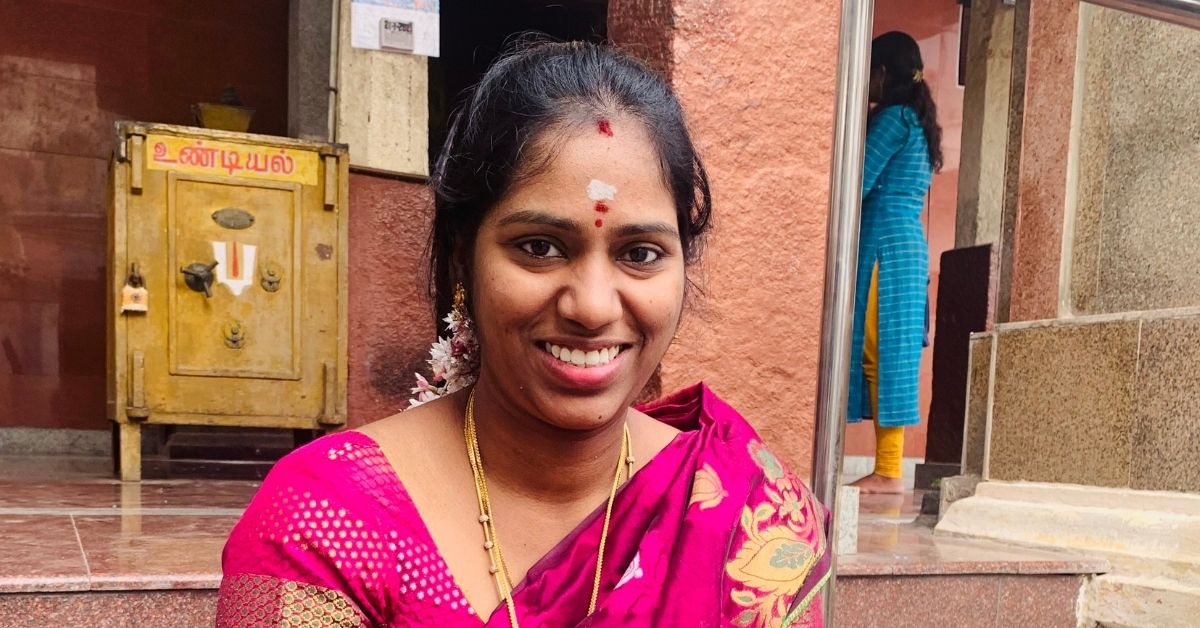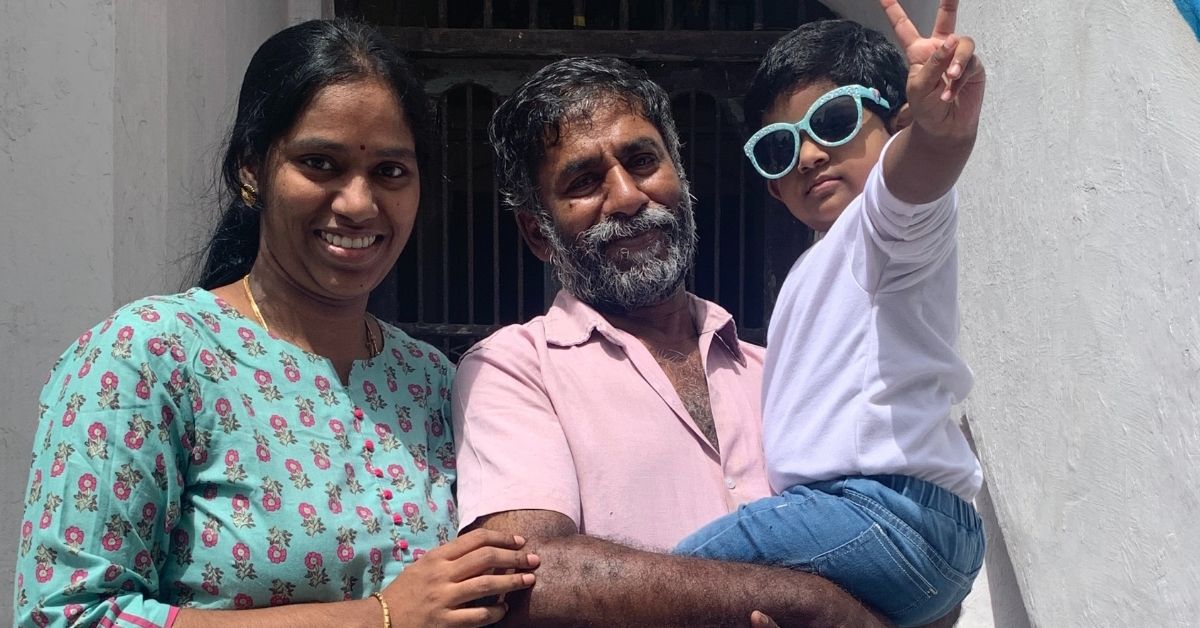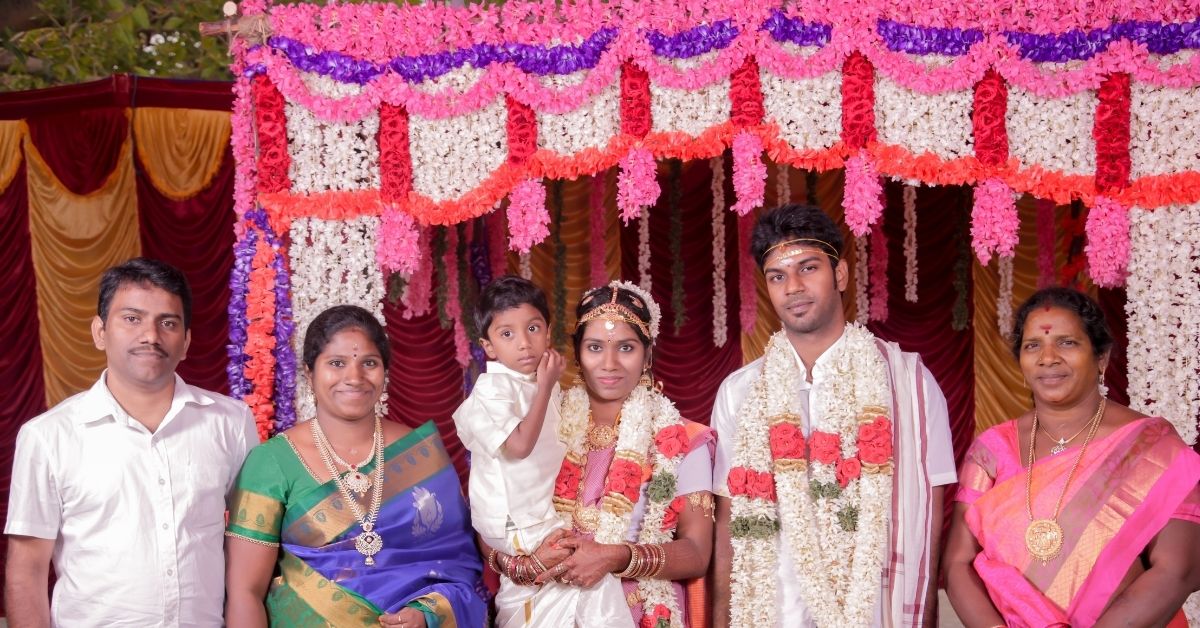When Madhu Priya was a little girl, she’d often spend time with her mother, who ran a vegetable shop in Chennai’s Egmore. One day, a woman entered the store, took a whole lot of vegetables, but only paid for half a kilo of tomatoes. Both Madhu and her mother took note, but the little girl watched as her mother quietly packed the vegetables, accepted the incomplete payment and let the woman go.
“Didn’t you see that she stole some vegetables?” young Madhu asked her mother, Devaki.
“Yes, I know,” her mother responded.
“Why didn’t you stop her?”
“If someone is stealing food, it means that they’re in need. They’re not doing it for fun. Maybe she needs to feed her family. It’s okay, we should let it go,” Devaki noted.
This incident became engraved in Madhu’s mind, and changed her perspective on life forever. “Nobody looks at the other side of the story,” Madhu, now 28, tells The Better India. “But my mother always did. This is a lesson I take with me no matter where I go or who I interact with.”

When Madhu was growing up, many failed to take note of her story and the struggles she saw as a daughter of two vegetable vendors, who did their best to make ends meet and educate their two young daughters. Recently, Madhu shared a post on LinkedIn in which she detailed her recent promotion, how her mother stood by her against all odds, and that despite the struggles they saw, Madhu is today the first-generation woman in her family to have obtained a Masters’ degree, first girl to be placed at an Indian MNC, first working mother and the first to get a promotion.
The elephant in the room
“My grandparents were plumbers from Hosur. My father was one as well, but as automation came in and motors began replacing pumps, my father had to start looking for alternative sources of income. So my parents decided to open a vegetable store,” Madhu says. “This was around 30 years ago. My sister and I were born a few years later. My parents, who are both school dropouts, wanted us to be educated in a convent school.”
Devaki herself had always wanted to study in a convent in Chennai, but her financial background never allowed her ample opportunities to do so. She tried to get both her daughters admitted to the school multiple times but failed. She constantly ran back and forth between running her store and trying to get in touch with the school administration. After three years of struggle, the school’s principal finally took note of how Devaki was trying to change the future laid out for her daughters, and Madhu was finally admitted to the school, followed by her sister the next year.
This school was a prominent one, where daughters of prominent personalities, celebrities and sportspersons studied. Madhu stood out as the odd one. “It became difficult for me to fit in there. I was made aware of an existing class divide some time after middle school, when people began to become more aware of their own rich backgrounds. The gap started to show. It wasn’t outright bullying that I faced — it was more like a simple exclusion,” Madhu explains.
During activities such as team sports, Madhu would be the final pick. Her participation in plays came last. “They didn’t want to hang out with someone from a different background. For these kids, whose upbringing, social circle and lives were completely different, I was someone who didn’t belong,” she adds.

Despite the discrepancies, Madhu says she was thankful to be where she was. “Maybe if I were in a government school, I would never have got the chance to see the other side,” she says.
During parent-teacher conferences, Madhu’s mother would always be the last to arrive. “My mother stood out from the other parents. Other parents would walk in dressed casually, but my mother would always plan her outfits at least a week in advance. But she’d always enter late and she later told me it was because she didn’t want to embarrass me. Any function where it was not necessary for her to attend, she wouldn’t come. I really wanted her there, but she didn’t want to be under the scrutiny of other parents, who would sit and judge her and try to figure out where she came from, whose mother she was or any other factor that could affect me negatively,” Madhu says.
After Class 10, the girls in Madhu’s school gained a better understanding of who they were. And so, even some of her closest friends began to distance themselves from her and joined other groups that had similar social standings. This exclusion became too much for Madhu to handle over time and as she neared Class 12, she became very sick. “I was diagnosed with pneumonia and couldn’t go to school for two months. I’d stopped eating. I had only three friends. One told me truthfully that her father didn’t want her to be friends with me. The other two slowly distanced themselves. I couldn’t handle this rejection. The only friend I had, then, was my mother,” she says. Madhu’s sister had transferred to another school by then.
That’s when Devaki told her that this was bound to happen some time. “It’s something we will have to go through and come out of,” she told Madhu.
Madhu pauses to note, “The class difference is always there but no one speaks about it. It’s the elephant in the room. It’s so real, but never acknowledged.”
When school was finally over, Madhu took a break for a month and then got admission in a college where she pursued English Literature. Some time during her second year, the two friends approached her with an offer of reconciliation. “They never apologised but I think that as maturity kicked in, they realised what they had done. I let it go. We’re still friends,” Madhu says.
A sweet victory
Asked what her motivation was to keep working hard despite the struggles she saw, Madhu says, “I felt like I was living a life that didn’t belong to me. But there were two people who were sacrificing everything for my sister and me. My parents would work day in and out, from morning to late at night, for my education. That fuelled me. It was my responsibility to do well in life.”
She adds, “My parents understood life and took it for what it is. They understood that their lives were a struggle for tomorrow, but they took it in their stride. I try to do the same thing now. Having seen my parents struggle, my own wants are limited. I believe in simplicity and being happy with what you have, which is something they taught me.”
Madhu says, “When I was working as an HR professional in a manufacturing unit, I used to spend a lot of time with the women contract employees. They used to tell me that no HR employee had ever taken the time out to speak to or even acknowledge them, which left a huge impact on me. I still receive sweet messages from these women on occasions such as my birthday and Women’s day. This I attribute to my mother, who treated all her customers with so much warmth and compassion.”
Devaki was grateful that they ran the long race and emerged victorious. “After I got pneumonia, my mother thought I would give up. I was an average student in school but things really turned around in college and I remained among the top three to five students throughout. I had more responsibility to prove that the background of the person does not matter — it’s about who you are. That’s something she taught me,” Madhu says. “When I was placed through my campus, my mother couldn’t believe it. Many of my colleagues, after getting to know me, reached out to her to commend her efforts.”

Today, Madhu works as an Associate Manager at an international IT firm. She has a young daughter, Diya. “My parents were not around a lot because of how hard they worked. So I want to be there for my daughter throughout. I’ll be there for her when she takes her first steps, when she says her first word, her first day of school and every milestone she achieves. I want to give her great memories and a good life. All the lessons my mother has taught me, I will pass down to her as well.”
For her own vision, Madhu now wants to dedicate her life to social work. After her post went viral, many schools and companies reached out to her to talk about her life. Her old school got in touch with her as well. “So many of my classmates reached out and apologised for being unaware of what I was going through,” she says.
For those going through similar struggles, Madhu has only this to say — “It is okay to be proud of your background no matter where you come from. There’s nothing to be ashamed of. Take life as it is, be thankful for what you have. Maybe your own life is someone else’s dream.”
You can reach out to Madhu through her LinkedIn here.
Edited by Yoshita Rao
No comments:
Post a Comment